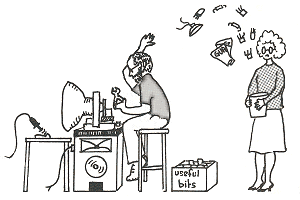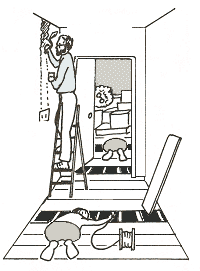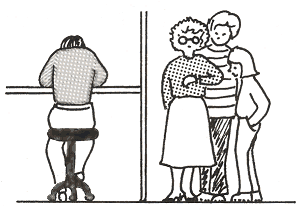Part 1 - Why do engineers always want to improve things?
There was a brief time when both John and I were writing for the Maplin Electronics magazine. We quickly realised that the magazine paid for content by the page, so we made sure we included lots of big diagrams and cartoons.
Part 2 of this Lament can be found here ...
A version of this article appeared in the Maplin Magazine of October 1989.

A few years ago, after twenty years of working for other people, my husband started his own electronics design consultancy. He now works for himself (and us) from home. This is great. It means that we can go to the pub for lunch whilst the kids are in school (not that we often have the time). On the other hand, there is no getting away from work, and weekends just do not exist if we have a deadline to meet.
My dilemma is acute if I am helping to meet the deadline, but I have now got it down to a fine art. Not the kind of Fine Art I learned about at school, but the kind you need to run a home and a business at the same time. Somehow clothes do get hurled into the washing machine in between printing the pages of long documents. I can whizz round with the vacuum cleaner or make the bed while the soldering iron is warming up, or keep an eye on the printed- circuit boards etching in the kitchen whilst I tidy up downstairs. If I don't do the shopping first, the days flash by in a flurry of receipts and cash books and VAT returns and tax returns and telephone calls and invoices and research for articles and going to exhibitions - and we have pizzas again for dinner.

As in all good organisations, we have a fair division of labour - he does the clever bits and I do the boring bits. This suits us both very well. I enjoy the boring bits (he doesn't) and anyway they tend to drive him nuts. But if I try to help with the clever bits why is it me that drives him nuts? Where does he get that awful patient expression from? It reminds me of how I used to feel when our children were little and ... ah, yes, well.
In between all this breadwinning activity (or at least sweeping up the crumbs) I get on with the ironing, or the plastering, or the decorating. It was whilst I was ironing that this lament surfaced in my mind. Being a dutiful engineer's wife I finished ironing before I reached for my word processor.
Thinking back over those twenty-odd years I realised that the unfairness of being the non-engineering wife of an engineer started early. Why did everyone start using transistors just as I finally understood valves? It continues to this day:- why was it fine soldering and not fine print that showed me that I needed reading glasses?
I never did any 'proper' science beyond the third year at grammar school - I was on the Arts side. In the late 1950s it was the sort of school where knowledge for its own sake was considered paramount. The practical applications of the subjects were limited to really useful things like an intimate knowledge of a cockroach's wingcase structure, or how to wash a woollen sock without it shrinking (believe it or not - we really did measure the damned things before and after washing them!). My practical knowledge of physics was zero and, what is worse, I didn't realise that it mattered. I thought that I had had a good education at a progressive school.
Then I met this bright young engineering student, mad about amateur radio and planes and fixing things. I wanted to discuss CND and George Orwell; he wanted to show me how a triode pentode valve worked. We still have it in a box, somewhere, in case it comes in useful. I should have realised what engineers are really like when my parents bought me a record-player and the budding engineer offered to build a better amplifier for it. He did, and it was better, and this was the start of a life-time of improving things.
 Why do engineers always want to improve things? Our very first brand-spanking-new television set was modified as soon as we got it home. The budding engineer was by now a graduate engineer, with an accumulated store of useful tools and components, and a technical gleam in his eye as he surveyed our first major electronic purchase. "What about the guarantee?" I wailed, but the engineer knew he could build a better sound system, and feed it through an external speaker. We missed a few evenings' television because we were working on the new circuit boards, but of course the sound was better when he had finished. The improved television stood firmly on a splendid cinema speaker donated by my father-in-law and modified by the engineer (the sound quality was amazing, by the way). Nothing went wrong so we didn't need the guarantee anyway.
Why do engineers always want to improve things? Our very first brand-spanking-new television set was modified as soon as we got it home. The budding engineer was by now a graduate engineer, with an accumulated store of useful tools and components, and a technical gleam in his eye as he surveyed our first major electronic purchase. "What about the guarantee?" I wailed, but the engineer knew he could build a better sound system, and feed it through an external speaker. We missed a few evenings' television because we were working on the new circuit boards, but of course the sound was better when he had finished. The improved television stood firmly on a splendid cinema speaker donated by my father-in-law and modified by the engineer (the sound quality was amazing, by the way). Nothing went wrong so we didn't need the guarantee anyway.
That cinema speaker was the first of many things passed on because we might be able to find a use for it. My mother-in-law is also the wife of an engineer, so I suppose it's my own fault that I didn't really take much notice of this practical example of what an engineer's wife has to put up with. Why hadn't she married a bus driver or a consultant neurologist? Bus drivers and consultant neurologists don't take their work home, and they don't keep boxes of useful bits in their cellars to pass on to their children when they move house or have a clear-out. A lot of the components that went into that television came from my father-in-law. I am pleased to say that the traffic is now two-way, and we vie with each other to leave the larger box at the other one's house.
At least you could see what you were building circuits with in those days. That television sound system was built on a big Vero board, using chunky transistors, big heat sinks, and resistors which didn't disappear for ever as soon as you dropped one on the carpet. Who uses big heat sinks nowadays? If anybody needs one we have a box full in the cellar, just in case they come in useful.
I am constantly baffled by the speed with which components change their size, shape and capability. In my earliest non-engineering days you could watch a valve warm up and practically see the signal passing through the circuit. Nowadays I have to remember to earth myself each time I approach the bench. I might accidentally touch a fragile little black spider-thing no bigger than a finger-nail that cost £8.95 and it's the last one we have in stock until the replacements come. Given a resistor colour chart (thank you, Maplin) I can sort components, but I must admit that I am very glad that we don't have room for a surface-mount machine. We have got enough to do without starting down that route.
Why do engineers' families always have to wait, because building 'the system' ourselves would be so much cheaper and result in such better quality? We all get so used to not buying 'it' readymade, because we can build 'it' ourselves, that we don't realise we are actually doing without something which would be really useful, or pleasurable, if only we had one.
This philosophy applies even in areas where we start off with no real skills, though we have acquired them by the time we have finished. So we have designed and installed our own central heating systems, plumbed in our own dishwashers, mended our own cars and built our own cupboards (out of real wood; none of your laminated chipboard in our house. Well, not much).
Or we used to - one of the ironies of the last few years is that we have been so busy that we have done just the designs, then passed them on to real plumbers, joiners and builders. Not, you notice, electricians. We (the engineer) said that of course we would do the wiring ourselves. But the engineer was so busy creating an elegant filter-design program on his new computer that he hadn't got time right then to install a new mains socket for the dishwasher in our nearly-completed new kitchen. Why not? Because he doesn't do the washing up, that's why not. I would also have liked to filter the plate-scrapings though the waste disposer. It was probably high-pass and low-pass, and elliptical for all I knew, but it wasn't wired in.
 Granted, the kitchen actually required a complete re-wire. During a 'weekend off' we got as far as channelling in the conduit and socket boxes, and feeding in the cables. So why did we stop, just because we had to take up the floorboards across three bedrooms and my office to get the ring return in?
Granted, the kitchen actually required a complete re-wire. During a 'weekend off' we got as far as channelling in the conduit and socket boxes, and feeding in the cables. So why did we stop, just because we had to take up the floorboards across three bedrooms and my office to get the ring return in?
After waiting for eleven years for her engineer husband to complete their half-finished home-built hi-fi system, a musical friend of mine finally went out and bought a tape player and cassette versions of her favourite but unplayable records. I hope I don't have to wait so long to get the kitchen finished.
At least I now have no hesitation in hacking a channel in the plaster to bury a length of conduit. I have an intimate knowledge of the mysterious spaces underneath our floorboards. Being an engineer's wife, I have drawn maps of the cabling and labelled the cables to match: documentation is an important part of our professional lives, so I don't see why it shouldn't apply to the domestic side as well. Our children have been involved too (though sometimes on the basis of 'It's your room so you can just put your book down and come and help'.) They can both now be relied on to notch joists, they can lay cable without putting twists in it, and they are both competent plasterers when it comes to covering up the conduit. But I feel they think that they suffer, being engineer's kids, and having to help to get the house intercom and TV distribution coax threaded through the walls and floors of our house instead of paying someone else to do it.
 Why do engineers' kids get kits for Christmas, when all they want to do is plug in the cheap-and-cheerful bottom-of-the-range tape player from Curry's and actually listen to Madonna or Elton John? With great fortitude, our children have unwrapped car kits, knitting kits, Maplin watch kits, aeroplane kits, electronics-for-twelve-year-old-kids kits, make-your-own-basket kits. We nearly subjected them to a build-your-own radio-controlled car kit. Thank goodness a business trip to Hong Kong included a visit to a toy shop, so impulse-buying saved hours of sharing the soldering irons and searching for dry joints.
Why do engineers' kids get kits for Christmas, when all they want to do is plug in the cheap-and-cheerful bottom-of-the-range tape player from Curry's and actually listen to Madonna or Elton John? With great fortitude, our children have unwrapped car kits, knitting kits, Maplin watch kits, aeroplane kits, electronics-for-twelve-year-old-kids kits, make-your-own-basket kits. We nearly subjected them to a build-your-own radio-controlled car kit. Thank goodness a business trip to Hong Kong included a visit to a toy shop, so impulse-buying saved hours of sharing the soldering irons and searching for dry joints.
 We all know that whenever small children go into the bathroom, time and reality have no further meaning for them. Why does the same apply when the engineer goes into his lab? How many family-hours are wasted whilst we wait for:
We all know that whenever small children go into the bathroom, time and reality have no further meaning for them. Why does the same apply when the engineer goes into his lab? How many family-hours are wasted whilst we wait for:
"I just want to try this mod ... I just want to measure this ... I just want to write this down."
And dinner goes cold at our friends' house, or the library is closed when we get there, or we have missed the train or the last post, or it's one o'clock in the morning again and why aren't we asleep?
However, I must confess that this last bit is catching. I just wanted to write this down, so the family is patiently waiting for dinner, clean clothes for tomorrow, and an early night. In that order. Engineers know that a woman's place is in the kitchen, so I must be off.
